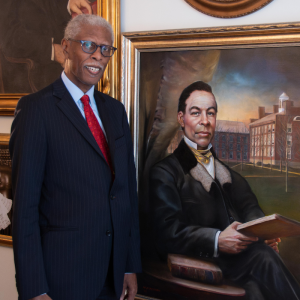When David Johnson (WRC ‘73) proposed a scholarship for someone who possesses a “visceral” sense of social justice, he had the legacy of John Sykes Fayette in mind.
Fayette was the first Black graduate of Western Reserve College—one of Case Western Reserve University’s predecessor institutions, then based in Hudson, Ohio. Arriving in Hudson in 1832, he became heavily involved in abolitionist causes as a theology student. After graduating and receiving a missionary assignment in Kitchener in Ontario, Canada, he went on to establish a school and several Presbyterian churches across the province.
In addition to the scholarship in Fayette’s honor, Johnson proposed the university commission a portrait of the historic alumnus to hang in Case Western Reserve’s presidential residence, Harcourt House.
President Eric W. Kaler’s wife, Karen Kaler, invited Johnson to unveil the work at a reception honoring the undergraduate Class of 1973 during CWRU’s 2023 Homecoming and Reunion Weekend.
“While (the portrait) was a tribute to John Sykes Fayette and African-American students,” Johnson said, “it was really a gift for the entire university, despite whatever one's racial or ethnic background may be. We could all see this as a celebration of a historic moment for the university.” The opportunity to unveil the portrait came as a surprise to Johnson, and he considers it a highlight of his 50th reunion.
Johnson has found significance in the parallels between his life and Fayette’s, particularly in how they both arrived at the university during pivotal moments in the nation’s history—for Fayette, in the early years of the abolitionist movement, and for Johnson, on the heels of the civil rights movement. Both were vocal about social justice as students, and throughout their lives, overcame numerous obstacles as Black men.
Johnson wants more people to know about Fayette’s legacy, and hopes to honor it through a scholarship in his name. Through the fund, Johnson said, the university can extend academic opportunities to students who, like Fayette, “march to the beat of [their] own drum in the pursuit of social change.”
To support the Fayette scholarship, contact John McCreery, director of special gifts, at jxm1225@case.edu or 216.368.5006.


